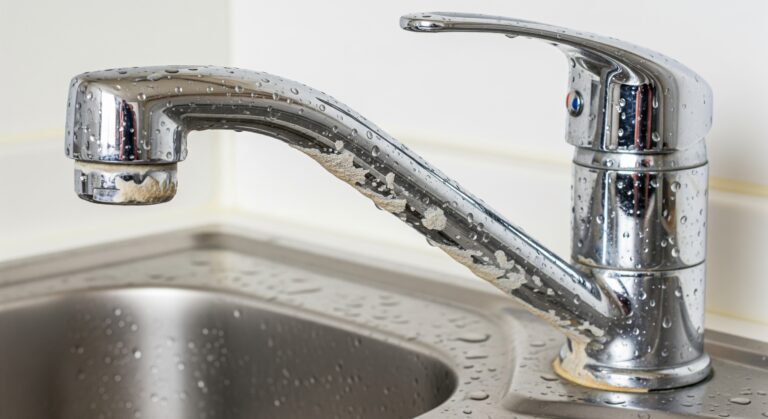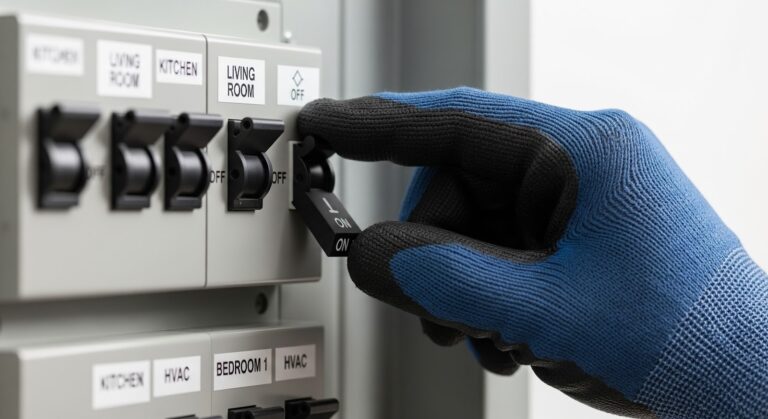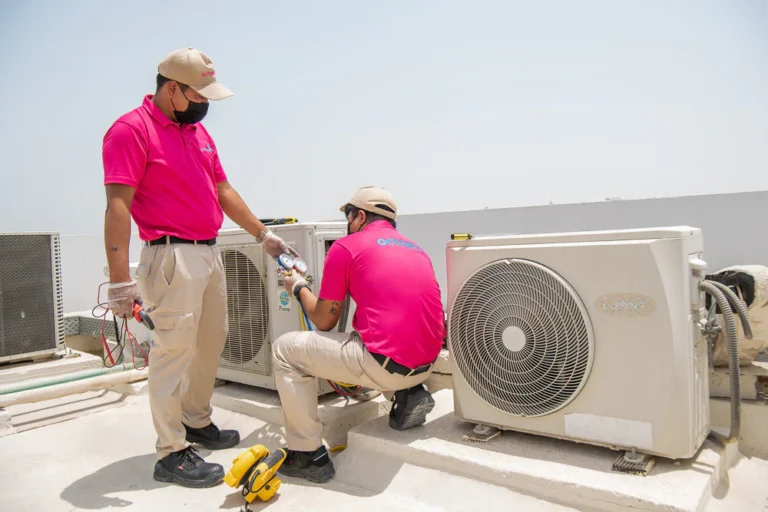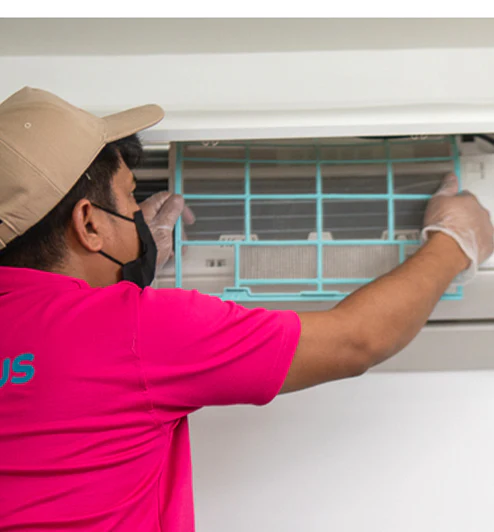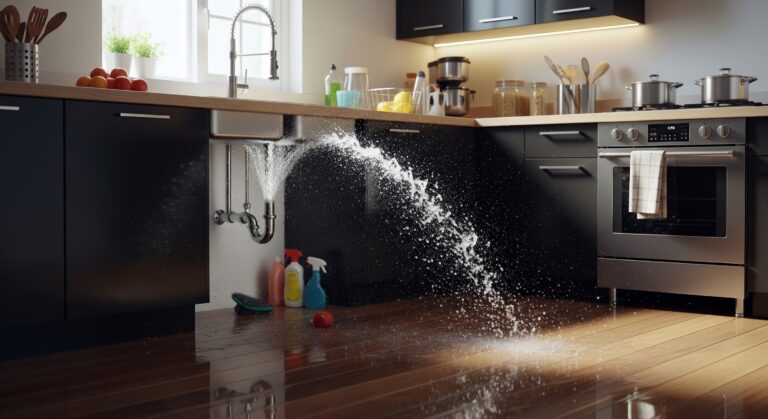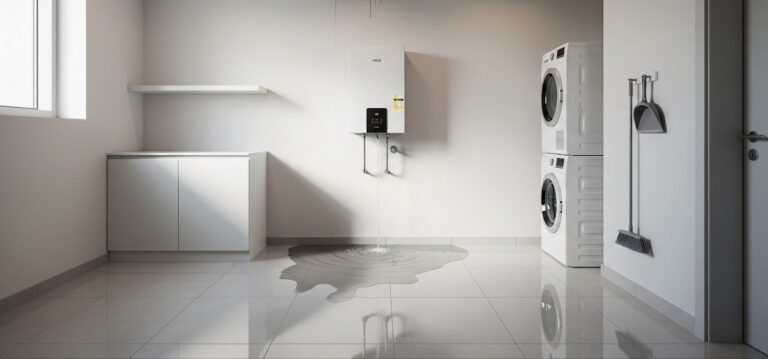It’s one of the most frustrating moments on a hot day. You turn on the AC, but there’s no cool air because the AC compressor is not turning on. The compressor is the core of your cooling system, pushing refrigerant through the unit to keep your space comfortable. When it stops working, your AC simply can’t cool.
The cause is often something fixable. In this article, we’ll cover the 7 most common reasons your AC compressor isn’t turning on, what they mean, and when it’s time to call a professional for help.
AC Compressor Is Not Turning On: Common Causes and Solutions
When your AC compressor fails to start, it’s usually a sign of an electrical, mechanical, or refrigerant-related issue. Knowing the exact cause helps prevent expensive repairs and restore cooling efficiency. Below are the most common reasons your AC compressor won’t turn on and expert-recommended solutions.
Check the Power Supply and Circuit Breaker
Power interruptions are the most frequent reason an AC compressor doesn’t start. A tripped breaker or loose power connection cuts energy flow to the outdoor unit.
Keep Your AC Running Smoothly
Don’t wait for a breakdown! Regular maintenance and quick repairs can extend the life of your AC and keep it running efficiently, saving you money on energy bills.
Fast & Reliable AC Service at Your Doorstep
Whether it’s a routine checkup or an urgent repair, our AC service ensures that your system is always working at peak performance. Let us handle the technical stuff while you stay cool.
- Confirm the outdoor condenser is properly plugged in.
- Check for tripped or overloaded breakers in the electrical panel.
- Reset the breaker and observe whether the compressor restarts.
Inspect the Thermostat Settings
A misconfigured thermostat can keep your compressor off even when the system appears functional.
- Ensure the thermostat is set to ‘Cool’ mode.
- Lower the temperature a few degrees below room level.
- Replace weak batteries or recalibrate the thermostat if it’s digital.
Examine the Condenser and Outdoor Unit
Outdoor units often accumulate dust, leaves, or small debris that can stop the compressor fan from spinning or block airflow.
- Inspect the condenser fins for dents or physical damage.
- Clear any dirt, plastic bags, or nesting material around the unit.
- Make sure the outdoor fan blades rotate freely.
Faulty Capacitor or Contactor
If you hear a click but no startup, a bad capacitor or contactor is likely. These parts regulate the power surge required to start the compressor motor.
- Test capacitors with a multimeter for proper microfarad readings.
- Examine contactor points for burns or pitting.
- Replace parts immediately if faulty to prevent motor overload.
Low Refrigerant Levels or Leakage Issues
Refrigerant is the lifeblood of your AC system. If levels drop, the pressure switch can shut off the compressor to prevent damage.
- Inspect for oily spots or frost on refrigerant lines.
- Use a pressure gauge to confirm low refrigerant.
- Call an AC technician for leak detection and system recharging.
Overheating or Safety Switch Activation
When a compressor overheats, it triggers an auto shut-off via the thermal overload protector.
- Check if the compressor casing feels excessively hot.
- Ensure adequate ventilation around the condenser.
- Reset the safety switch after allowing the unit to cool.
Compressor Motor Failure
If none of the above helps, your compressor motor could have burned out due to electrical shorting or age.
- Listen for clicking or humming without compressor engagement.
- Check for visible burn marks or melted wires.
- Seek immediate professional inspection—motor replacement may be necessary.
Dirty Air Filters Restricting Airflow
A dirty filter restricts airflow, forcing the compressor to overwork until it fails to cycle on.
- Examine air filters monthly for dirt accumulation.
- Replace or wash them regularly, especially during high-use months.
- Ensure airflow is unobstructed from vents to the outdoor unit.
Clogged Condenser Coils
Dirt buildup on coils prevents heat exchange and can force the system into shutdown mode.
- Check for dust, grease, or bird droppings on coils.
- Clean using a coil cleaner or gentle water spray.
- Schedule seasonal tune-ups to keep coil efficiency high.
How do You Manually Start Your AC Compressor?
Manually starting your AC compressor can be a temporary solution if it’s not turning on automatically. However, it’s important to follow safety precautions and use the right tools.
Safety Precautions Before Starting an AC Compressor Manually
Safety should be your top priority when attempting to manually start an AC compressor. Ensure you take the necessary precautions to avoid injury or damage.
- Turn off the power supply before attempting any manual start.
- Wear protective gear, such as gloves and safety glasses.
- Follow all safety guidelines and instructions.
Tools You’ll Need to Start the AC Compressor Manually
Having the right tools on hand can make the process of manually starting the AC compressor easier and safer.
- Multimeter for checking electrical connections.
- Screwdriver set for accessing components.
- Hard start kit for manual activation.
Locating the AC Compressor and Capacitor
Before you can manually start the compressor, you need to locate it and the capacitor within the AC unit.
- Identify the location of the compressor in the outdoor unit.
- Locate the capacitor, which is usually near the compressor.
- Refer to the unit’s manual for specific locations.
Checking the Power Supply and Circuit Breaker
Ensure that the power supply and circuit breaker are functioning correctly before attempting a manual start.
- Verify that the unit is receiving power.
- Check the circuit breaker for any issues.
- Reset the breaker if necessary.
Bypassing the Thermostat to Trigger the Compressor
Bypassing the thermostat can help trigger the compressor manually if it’s not responding to normal controls.
- Disconnect the thermostat wires to bypass it.
- Use a jumper wire to connect the appropriate terminals.
- Monitor the compressor for signs of activation.
Using a Hard Start Kit for Manual Compressor Activation
A hard start kit can provide the extra boost needed to manually start the compressor.
- Install the hard start kit according to the instructions.
- Connect the kit to the compressor and capacitor.
- Attempt to start the compressor using the kit.
Signs the Compressor Has Successfully Started
Once the compressor has started, there are several signs to look for to confirm successful activation.
- Listen for the sound of the compressor running.
- Check for cool air coming from the vents.
- Monitor the system for any unusual noises or vibrations.
Troubleshooting If the Compressor Doesn’t Start
If the compressor still doesn’t start, further troubleshooting may be necessary to identify the issue.
- Recheck all connections and components.
- Ensure the hard start kit is installed correctly.
- Consult a professional if the problem persists.
When to Call a Professional HVAC Technician
If manual attempts to start the compressor fail, it’s best to call a professional HVAC technician for assistance.
- Seek professional help for complex issues.
- Avoid further damage by consulting an expert.
- Consider regular maintenance to prevent future problems.
Why Choose Octopus for AC Repair and Maintenance in Dubai
Choosing the right service provider for AC repair and maintenance is crucial for ensuring the longevity and efficiency of your system. Octopus offers several advantages for customers in Dubai.

Trained Technicians with Years of Experience
Octopus employs trained technicians with extensive experience in AC repair and maintenance. Their expertise ensures that your system is in good hands.
- Technicians are highly trained.
- Years of experience in handling various AC issues.
- Commitment to quality service and customer satisfaction.
Advanced Tools and Genuine Replacement Parts
Using advanced tools and genuine replacement parts, Octopus ensures that repairs are done efficiently and effectively.
- Access to the latest tools and technology.
- Use of genuine parts for reliable repairs.
- Ensures long-lasting solutions for your AC system.
Fast, Reliable, and Affordable AC Services Across Dubai
Octopus provides fast, reliable, and affordable AC services throughout Dubai, making them a top choice for many customers.
- Quick response times for urgent repairs.
- Reliable service with a focus on customer satisfaction.
- Competitive pricing for all AC services.
Preventive Maintenance Plans for Long-Term Savings
Octopus offers preventive maintenance plans that help customers save money in the long run by avoiding costly repairs.
- Regular maintenance to prevent major issues.
- Customized plans to suit individual needs.
- Long-term savings through efficient system operation.
Can a Blown Fuse Cause the AC Compressor Not to Turn On?
A blown fuse can indeed prevent the AC compressor from turning on. Understanding how this happens can help you address the issue effectively.
What Happens When an AC Fuse Blows
When an AC fuse blows, it interrupts the electrical circuit, cutting off power to the compressor and other components.
- The electrical circuit is interrupted.
- Power is cut off to the compressor.
- The system may not operate at all.
How a Blown Fuse Affects the Compressor
A blown fuse directly affects the compressor by preventing it from receiving the necessary power to start.
- Compressor cannot start without power.
- Other components may also be affected.
- System performance is compromised.
Signs Your AC Fuse Might Be Blown
There are several signs that can indicate a blown fuse in your AC system.
- The AC unit does not turn on at all.
- No response from the compressor or fan.
- Visible damage to the fuse or fuse holder.
How to Fix or Replace a Blown Fuse Safely
Fixing or replacing a blown fuse requires caution to ensure safety and proper operation.
- Turn off the power supply before replacing the fuse.
- Use a multimeter to test the fuse for continuity.
- Replace the fuse with one of the same rating.
Terminal Connection Issues in AC Compressor Systems
Terminal connection issues can affect the performance of the AC compressor. Identifying and fixing these issues is crucial for system efficiency.
What Are Terminal Connections in an AC Compressor?
Terminal connections are the points where electrical wires connect to the compressor, allowing it to receive power.
- Points where wires connect to the compressor.
- Essential for power transmission to the compressor.
- Must be secure and free of damage.
Common Causes of Loose or Burnt Terminal Connections
Loose or burnt terminal connections can result from various factors, affecting the compressor’s performance.
- Vibration causes connections to loosen.
- Corrosion or oxidation of terminals.
- Overheating leads to burnt connections.
How Faulty Connections Affect Compressor Performance?
Faulty terminal connections can lead to poor compressor performance and potential system failure.
- Interrupts power supply to the compressor.
- Causes inefficient operation and potential damage.
- May lead to complete system shutdown.
How to Inspect and Fix Terminal Connection Issues Safely
Inspecting and fixing terminal connection issues requires careful handling to ensure safety and effectiveness.
- Turn off the power supply before inspection.
- Check for loose or corroded connections.
- Tighten or replace connections as needed.
Professional AC Compressor Diagnosis and Repair
Professional diagnosis and repair are essential for addressing complex AC compressor issues effectively.
Why Professional Diagnosis Matters for AC Compressors
Professional diagnosis ensures that the root cause of compressor issues is identified and addressed correctly.
- Accurate identification of underlying problems.
- Prevents unnecessary repairs and costs.
- Ensures long-term system reliability.
Key Steps Technicians Take to Identify Compressor Problems
Technicians follow a systematic approach to diagnose compressor problems accurately.
- Conduct a thorough inspection of the system.
- Use diagnostic tools to assess performance.
- Identify and address specific issues.
Common Repairs Performed on Faulty AC Compressors
Several common repairs can be performed on faulty AC compressors to restore functionality.
- Replacing faulty capacitors or contactors.
- Repairing or replacing damaged wiring.
- Addressing refrigerant leaks and recharging the system.
When to Repair vs. Replace Your AC Compressor
If your AC unit is relatively new and the problem is minor, such as a faulty capacitor, contactor, or wiring issue, repairing it is often the best choice. However, if the compressor has failed completely, the system is over a decade old, or the repair cost exceeds 40% of a new unit, replacement is usually more practical.
Upgrading to a modern system with an energy-efficient compressor and environment-friendly refrigerant can lower electricity costs and reduce maintenance. For an accurate decision, always get a professional inspection to assess repair costs and overall system condition.
Preventive Maintenance for AC Compressor Longevity
Preventive maintenance is key to extending the lifespan of your AC compressor and ensuring efficient operation.
Professional Maintenance Tips to Extend Compressor Lifespan
Following professional maintenance tips can help extend the lifespan of your AC compressor.
- Schedule regular maintenance checks.
- Clean and replace air filters regularly (Replace the air filter every 1-3 months).
- Monitor refrigerant levels and address leaks promptly.
Importance of Regular AC Compressor Maintenance
Regular maintenance is crucial for preventing major issues and ensuring efficient system operation.
- Prevents costly repairs and system failures.
- Ensures optimal performance and energy efficiency.
- Extends the overall lifespan of the system.
Essential Maintenance Tasks for Compressor Health
Several essential maintenance tasks can help maintain the health of your AC compressor.
- Inspect and clean condenser coils regularly.
- Check and tighten electrical connections.
- Lubricate moving parts as needed.
Final Thoughts
Understanding the reasons why your AC compressor is not turning on and knowing how to address these issues can save you time and money. Regular maintenance and professional assistance are key to ensuring the longevity and efficiency of your AC system. By following the outlined steps and considering professional services like those offered by Octopus, you can keep your AC system running smoothly and efficiently.


